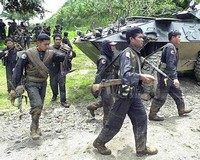More than 20 years after the collapse of the Soviet Union, with most of the world’s attention having shifted to the threat of international terrorism, the Philippines and Peru are still struggling to pacify their countries’ communist insurgencies. Rather than fading into history, the Philippines’ New People’s Army (NPA) and Peru’s Shining Path have updated their rhetoric to reflect contemporary concerns in an effort to make their ideologies relevant to the “masses” in the post-Cold War era.
The NPA and Shining Path, which were founded in 1969 and 1982, respectively, have not abandoned their discourse on Marxism and land reform, but their justification for attacks on multinational corporations and the government now centers on indigenous peoples’ rights and the environment. On Oct. 3, 2011, 200 NPA fighters launched simultaneous attacks on three mining companies in Surigao del Norte in northeast Mindanao, destroying roughly $11.5 million worth of equipment and facilities and briefly taking employees hostage. The Communist Party of the Philippines, the NPA’s parent political organization, released a statement saying that the attacks were carried out for “the protection of the environment and natural resources and the defense of the rights of the Lumad [indigenous] people, peasants and workers.” In another statement, released on March 29, 2012, to commemorate the 43rd anniversary of the group’s founding, an NPA spokesperson listed popular protest actions carried out by the group as being focused on “environmental destruction caused by large-scale mining, logging and plantation, [and] massive land-grabbing of peasant lands.”
Peru has seen similar attacks against multinational corporations in recent months. On April 9, Shining Path fighters took hostage 36 Peruvian laborers working for the Swedish company Skanska, which is building the Camisea gas pipeline that passes through the Apurimac and Ene River Valley (VRAE). Before retreating, the fighters made speeches to villagers about the environmental effects of the pipeline on local communities. Two months later, on June 7, 30 armed Shining Path members entered the encampment of another company, Transportadora de Gas del Peru, also in the VRAE, and took 19 workers hostage. The workers were freed the same day, but not before the Shining Path issued a letter to the consortium of companies working on the Camisea gas pipeline calling on them to “respect the agreements with the indigenous peoples.”

